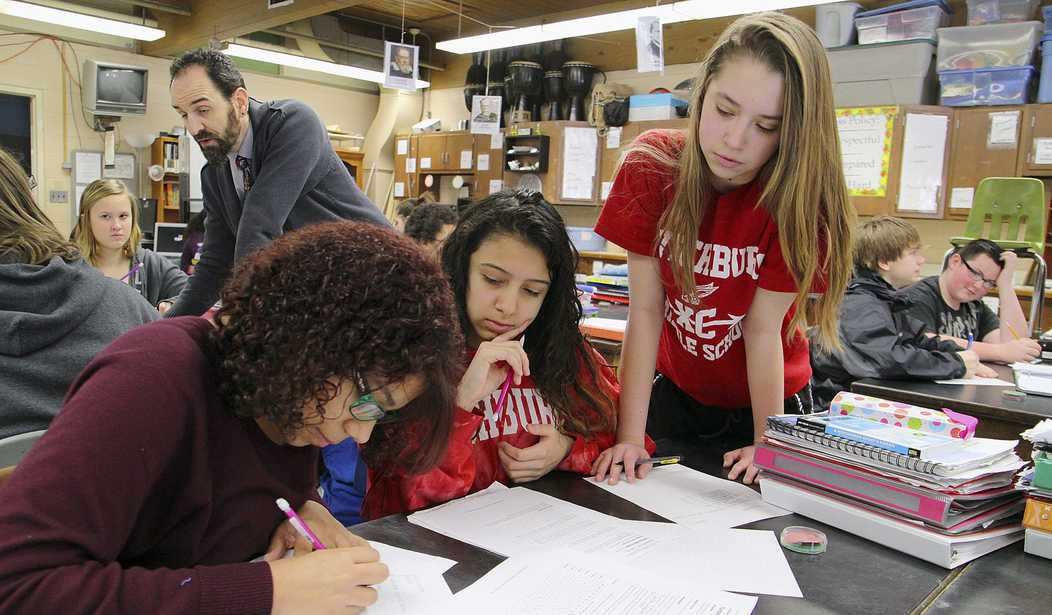Advocates of legislation known as Language Opportunity for Our Kids (LOOK), signed by Massachusetts Gov. Charlie Baker (R) in November, called it a victory for children who don’t speak English as a first language, as well as for education in general.
The Boston Herald editorial staff didn’t celebrate.
“Beacon Hill quietly undid the will of the voters last week,” the Herald team declared.
Todd DuBois, a spokesman for U.S. English, Inc., told PJM the legislation circumvented the will of 61 percent of voters in 2002 who cast ballots in favor of Question 2, which mandated the teaching in English to kids who don’t speak English as a first language.
“This (Question 2 approval) happened in reaction to an era of ‘transitional bilingual education’ policies implemented in the 1970s that left too many students lagging behind in English literacy,” DuBois said. “Non-English native languages can be nurtured in homes and communities, but the first duty of a public school is to prepare its students for the world.”
“That means treating English as a vital subject, just like math and science,” DuBois added.
However, Helen Solorzano, executive director of the Massachusetts Association of Teachers of Speakers of Other Languages, said precisely the opposite was true.
She said 15 years of requiring all students to be instructed in “sheltered English immersion programs” have proven Question 2 to be a failure.
“Teachers have long recognized that many English learners were falling through the cracks under the current system,” Solorzano said. “With the passage of the LOOK bill, we will be able to tailor programs to help all our students succeed academically.”
This debate is more than an academic argument. The fates of tens of thousands of Massachusetts public school students are riding on who is right and who is wrong.
According to The Massachusetts Language Opportunity Coalition, which backed the LOOK legislation, more than 90,000 public school students, 9.5 percent of the total enrollment, are “English learners.”
The Language Opportunity Coalition said the gap between kids who speak English and those who don’t grew wider since the implantation of Question 2. Now, so-called “English learners” have the highest dropout rate for all public school children in Massachusetts and only 64 percent graduate with their classmates.
Eva A. Millona, executive director of the Massachusetts Immigrant and Refugee Advocacy Coalition, said more than 150 languages are spoken in the state’s public schools “and navigate between cultures every day.”
“That is a huge advantage on the global stage, and we need to build on it,” Millona added.
DuBois said she couldn’t be more wrong. He argued that kind of thinking doesn’t reflect the real world that students will face when they graduate.
DuBois said there “is no substitute for a strong commitment to English immersion and capable English teachers for English literacy and success for kids in the 21st century.”
“One-quarter of the global population speaks English fluently, while English is widely accepted as the language of business and commerce,” DuBois also said. “In the United States English remains our common language; English literacy is vital for any student dreaming of a college education.”
The challenge of schools packed with kids who speak scores of different languages isn’t one that Massachusetts faces alone, nor is it only a problem for educators in America.
The Brookings Institution found nearly one of every 10 working-age adults in the U.S. doesn’t speak English fluently.
The Brookings report also gives DuBois evidence that it’s in the best interest of public school students to become proficient in English since those who can handle the language earn as much as 135 percent more than those who aren’t fluent in English.
“English proficiency is an essential gateway to economic opportunity for immigrant workers in the United States,” the Brookings report concluded.
But what’s done is done, at least in Massachusetts.
Boston Herald editorial staff grudgingly accepted the LOOK legislation, noting “the English immersion requirement in Massachusetts public schools has not been executed particularly well.”
“School officials ought to be warned against a return to the bad old days, when too many kids were allowed to graduate from Massachusetts high schools without the ability to speak English,” the Herald also warned.
DuBois agreed with that sentiment, stressing the educators of Massachusetts “have a duty to not answer today’s challenges by repeating old mistakes in the name of competition in a global environment.”
“As for any ‘transitional bilingual education’ strategy tried today, it must at least be worthy of the name with an intense emphasis on helping children become as comfortable with English as their native language as soon as possible,” DuBois added. “Anything less will do harm to students in the long run.”









Join the conversation as a VIP Member